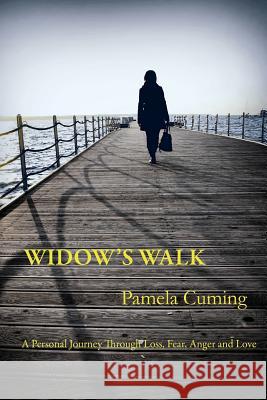Widow's Walk: A Personal Journey Through Loss, Fear, Anger and Love » książka
Widow's Walk: A Personal Journey Through Loss, Fear, Anger and Love
ISBN-13: 9781539793144 / Angielski / Miękka / 2016 / 338 str.
Pamela Cuming is thirty-four years old when her husband dies of a heart attack. With Bill's death, she loses not only a husband and best friend but her business partner as well. She must rebuild her life, raise two children, and run the consulting firm she and Bill once co-managed. But first she must face the fact that she is a widow. To her credit, Pamela Cuming is a take-charge kind of woman. However, in reality, she rides an emotional roller coaster-one moment soaring with pleasure over her own independence and insight; the next moment plunging into terror over her loss and feelings of inadequacy. Pamela Cuming traces her first year's journey through the fears and frustrations of widowhood; her own angry despair; her children's grief; and the necessity of coping with all the chores her husband once handled-getting the car fixed, painting the house, taking over the adminsitrative end of their business. She speaks about an anxiety she cannot always control, the fear of sleeping in "their" bed, the depression of holidays and anniversaries, and the overwhelming sense of being alone. Yet somewhow she does begin to set things right and to redefine her personal boundaries. At the end of the first year without her husband, Pamela Cuming is a significantly different person. Her values and priorities have been aired and reorganized, and her individuality has been acknowledged and remains intact. Widow's Walk is a bold, brave, and candid admission of bereavement, weakness, and ultimately, strangth. It tells a story that is as relevant to widows and widowers today as it was in 1979 when she experienced her loss. In some respects, that was a very different time. There were smoking sections in airplanes, often separated from the non-smoking sections by only an aisle. It was customary to order cocktails at lunch. There were no cellphones. Personal computers were still on the drawing board. She wrote Widow's Walk on a Smith Corona typewriter. It was a different time, and yet the emotions she felt back then when her husband's heart stopped beating were the same as any widow or widower feels today. Then and now, widowhood feels like walking through the land of the shadows. The world is blurry. Normal conversation about mundane subjects is strained and tedious. Time moves slowly. The days are endless and the nights are even longer. You struggle to reach through the shadows and grasp something real, but there is nothing there. Emerging from the land of the shadows is the awful challenge that all widows and widowers face. Widow's Walk sheds light on how to navigate that dark path. The first edition of Widow's Walk was published in 1981. The second edition includes a preface and an epilogue, and has been edited to make the book more readable.
Zawartość książki może nie spełniać oczekiwań – reklamacje nie obejmują treści, która mogła nie być redakcyjnie ani merytorycznie opracowana.











